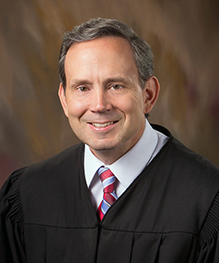 TOPEKA—Chief Judge Grant Bannister of the 21st Judicial District has been appointed to sit with the Kansas Supreme Court to hear oral arguments in one case on the court's September 14-18 docket conducted entirely by videoconference.
TOPEKA—Chief Judge Grant Bannister of the 21st Judicial District has been appointed to sit with the Kansas Supreme Court to hear oral arguments in one case on the court's September 14-18 docket conducted entirely by videoconference.
Oral arguments will be livestreamed on the Supreme Court YouTube channel.
After hearing oral arguments, Bannister will join Supreme Court justices in their deliberations and decision drafting.
"The Supreme Court looks forward to Chief Judge Bannister hearing a case with us. He will read the case materials, prepare for oral argument, and deliberate with the court on its decision," said Chief Justice Marla Luckert. "We thank Judge Bannister for helping us, especially because we know he already has a significant caseload in district court to handle."
Bannister became a district judge in the 21st Judicial District in 2016. The Supreme Court appointed him chief judge in 2019. The 21st Judicial District is composed of Clay and Riley counties.
“It is an honor to serve with the Supreme Court,” Bannister said. “I appreciate the opportunity to participate in the important work of the court, and I look forward to this experience.”
Bannister is a Hays native and attended Fort Hays State University. After graduating from the University of Kansas School of Law in 1997, he was in private practice in Manhattan for 19 years and served as an adjunct professor teaching ethics in the College of Business at Kansas State University.
Bannister will hear one case at 1:30 p.m. on the September 15 docket:
Appeal No. 117,839: Building Erection Services Co. Inc. v. Walton Construction Co. Inc.
Johnson County: (Petition for Review) This case concerns problems with the construction of a press box at University of Kansas Memorial Stadium almost 20 years ago. On the first appeal, the district court held Building Erection Services (BESCO), one of the subcontractors on the project, was contractually obligated to indemnify Walton Construction, the general contractor and assignee of KU's indemnification rights, for remediation damages, attorney fees, and expenses because BESCO failed to anchor a glass curtain wall system to the press box substructure in accordance with shop drawings. The Court of Appeals reversed the district court's order that BESCO pay all the remediation costs as damages and remanded for the district court's "determination of those damages that arose out of, or resulted from, BESCO's negligent acts or omissions." On remand, the district court conducted a second evidentiary hearing and assessed half the costs of removing the metal wall panels and glass that comprised the press box's curtain wall to BESCO. On a second appeal, the Court of Appeals held substantial competent evidence did not support an assessment of half the remediation costs to BESCO. The court also reversed the attorney fees award, finding it was not supported by substantial competent evidence. On the second remand, the district court reinstated the award assessing half the glass removal costs and increased the award for the metal panel removal costs to 85% with no new evidence from Walton. The district court also reinstated the reversed attorney fees award. BESCO appealed, arguing the district court failed to comply with the second remand and substantial competent evidence did not support the third damages award. In the third appeal, the Court of Appeals reversed the district court, holding that substantial competent evidence does not support the damage award and held Walton did not provide evidence to support the damage award. The Court also reversed the attorney fees award. Issues on review are whether the Court of Appeals: 1) properly reversed the district court ruling under the law of the case doctrine and mandate rule; and 2) was correct in reversing the attorney fees award.